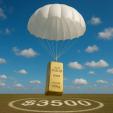US economy still seems to look fragile
Philadelphia (June 14) Stock prices’ robust recovery from financial crisis belies some worrying economic signs. Americans are grappling with dueling realities: Their portfolios have mostly recovered from the painful financial crisis, and might even show some tasty profits. But the US economy seems fragile, and the labour participation rate is lousy.
Most assume that when the stock market does well, the economy is booming. But that is not the case these days. “When companies are doing well, stock prices do well, so the economy must steam full ahead,” said Esme Faerber, professor of business at Rosemont College. “But it often doesn’t work that way.”
These conflicting realities are confusing. Financial assets are reaching new heights, prompting some market watchers to wonder whether another crash lurks around the corner. But stocks buyers are complacent; the so-called fear gauge, the CBOE Volatility Index, is nearing its historic low of 9.89 in January 2007 just before the world economy and the markets plummeted and launched the Great Recession.
So what to make of these incongruities? The economy is at an inflection point, experts say.
“We sometimes see this sort of paradox between economic conditions and the financial markets. The reason is, the stock market reflects sentiment right now, as well as economic fundamentals in the future,” said Joe Davis, global chief economist at Vanguard in Conshohocken, Pa.
Corporate America is buying back its own shares, bolstering the markets but failing to invest in new business and equipment that could propel the economy.
According to the data service Capital IQ, the biggest buyers of stocks in the first quarter 2014 were the companies of the S&P 500 itself, which cumulatively repurchased $160 billion of their own shares.
By keeping interest rates low, the Federal Reserve is doing everything it can to prevent a feared economic downturn, but at the same time, the central bank recognizes that some financial assets may be overheating.
Said Warren West, of Philadelphia’s Greentree Brokerage: “The Fed can’t have it both ways.
One abnormality forcing a divergence of markets and economy is enduring low interest rates.
The stock market still anticipates economic growth, however tepid, Faerber said. “There’s a strong correlation going back over decades, that when interest rates are low, the stock market does well.
“Right now, rates are extremely low, to a point near zero for years, which we’ve never experienced before.”
Source: GulfToday










